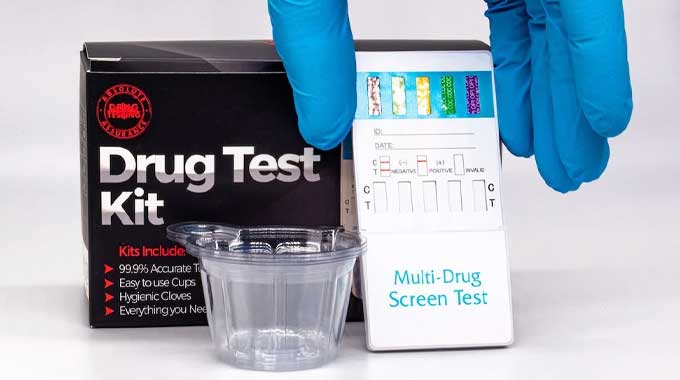How Long Does Heroin Stay in Your System?

Heroin is a highly addictive opioid drug that is contributing to the opioid crisis in the US. With heroin use comes the risk of overdose as well as negative effects on physical and mental health and behavioral and societal effects such as the breakdown of relationships, increased crime, and increased hospital admissions.
The United States Department of Health and Human Services announced an opioid epidemic in 2017 in response to the increasing number of opioid-related deaths. In 2019, over ten million people in the US misused opioids.
Heroin is a dangerous opioid partly due to being produced solely illicitly. This means that it is difficult to know the potency of heroin you are taking and whether it has been mixed with other substances. However, despite these risks, in 2020 902,000 Americans who were twelve or older reported having used it in the last year.
We will discuss the risks associated with heroin use as well as how long it stays in your system. Understanding this can help you to understand the risks of taking frequent doses of heroin in a short period. We will also discuss treatment options for heroin addiction in case you or a loved one would like to seek treatment.
What is Heroin?
Heroin is a semi-synthetic opioid drug that is made by chemically processing morphine, a naturally occurring opioid extracted from poppy seeds. Heroin is a central nervous system depressant. It binds to opioid receptors which leads to the release of dopamine in the reward pathways of the brain. Heroin causes detachment from emotional and physical pain, causing pain relief. It also causes a euphoric rush which is followed by feelings of bliss and tranquillity.
Heroin is a fast-acting drug; it enters the brain rapidly across the blood-brain barrier and is quickly metabolized into morphine and 6-acetyl morphine. So, while it effectively acts as morphine once it enters the brain, it is more potent because it passes the blood-brain barrier quicker causing a more intense high. Many people inject heroin rather than smoking it or taking it in pill form because this causes it to reach the brain even faster.
Heroin is a Schedule I drug which means it has a high potential for causing abuse and dependence and is not considered to have any medical use. This is partly due to its potency, however, fentanyl which is an opioid that is about fifty times more potent than heroin is used medically despite its potency and potential for causing addiction. Pure heroin is a fine white powder, but it can also appear brown and grainy or even sticky due to impurities.
Effects of Heroin
Common side effects of heroin use include:
- Euphoria
- Decreased heart rate
- Respiratory depression
- Decreased cognitive function
- Poor coordination
- Drowsiness
- Sedation
- Substance use disorder
There are also severe effects due to impurities and needle sharing. It is common that heroin is mixed with blood vessel clogging additives which can lead to permanent organ damage such as to your brain, lungs, livers, and kidneys. Sharing needles increases your risk of contracting communicable diseases such as HIV, Hepatitis B, and Hepatitis C. It also increases your risk of blood poisoning, collapsed veins, and skin infections.
Heroin Overdose
Whether you are taking heroin for the first or hundredth time, it is possible to overdose. Opioids kill more than 136 Americans every day and are involved in seven of every ten overdoses, nearly twenty percent of these involve heroin. Because heroin is unregulated it is difficult to know how strong it is unless you have the means to test it. If you are used to taking weaker heroin and then get a strong batch, there is a higher risk of overdosing. Additionally, if you get heroin mixed with fentanyl, which is becoming increasingly common, there is a much higher risk of overdosing. Fentanyl is so potent that just 4 mg can cause an overdose.
It is helpful to know how long heroin stays in your system because it may be tempting to take increasingly high and frequent doses of it to achieve the same effects. However, while the effects of heroin may be wearing off, metabolites will stay in your body much longer, and increasing the concentration of these can be dangerous.
Related: Heroin Detox
How Long Does Heroin Stay in Your System?
The time it takes for heroin to leave your system relates to its half-life. A half-life is the time it takes for the concentration of a drug to reduce to half of its maximum concentration in your blood plasma. It takes about four to five half-lives before a drug leaves your system.
Heroin has a relatively short half-life compared to other drugs at about seven to eight minutes. Drug tests will therefore generally work by detecting the metabolites of heroin which have longer half-lives. Morphine has a half-life of about two to three hours, whereas 6-acetyl morphine has a half-life of just over twenty minutes.
Testing for Heroin

There are different drug tests that are used to detect whether you have used heroin. The most common method is through urine tests, however, blood, saliva, and hair follicle tests are also used. You can detect the use of heroin for different lengths of time after your last dose depending on which test you use. It is also worth noting that depending on how long and heavily you have been using and on personal factors, the time period for detecting heroin use can vary.
Factors Which Affect How Long Heroin Stays in Your System
How long heroin remains in your system depends on multiple factors including:
- metabolism
- genetics
- age
- diet and hydration
- length of use
- frequency of use
- liver problems
- weight and body mass
- and drug interactions
If you have been using heroin for longer and more frequently, drug tests may be able to detect heroin for longer.
Urine Tests
Urine tests are the most common drug test for detecting heroin. They are low-cost, quick, and widely available. They are also physically non-invasive, although there are arguments that drug testing at workplaces and other settings is personally invasive and can be discriminatory. A urine test can typically detect heroin metabolites for up to two days through the detection of morphine and up to eight hours through the detection of 6-acetyl morphine.
Blood Tests
Blood tests are less commonly used as they are more invasive and expensive. However, they are often used after traffic accidents or overdoses and are thought to be more accurate. They can detect heroin use for up to six hours after your last dose.
Saliva Tests
Saliva tests can detect heroin metabolites for about four to twenty-four hours for those who have smoked heroin but could be less for those injecting the drug.
Hair Tests
Hair tests can detect heroin for the longest period of time. They can detect the use of heroin for up to three months after your last dose.
False-Positive Results
It is possible to get a false positive heroin test. It is thought that heroin tests may be able to detect morphine from poppy seeds consumed in your diet. It may also detect medications that you are using. It is therefore important to inform the person testing of which medication you are currently using or have used in the period of time they are testing for.
Drug Abuse and Addiction
It is important to understand heroin abuse and addiction so that you can assess whether you or a loved one needs treatment. There is a lot of stigma which surrounds heroin addiction that makes it hard to reach out for support. However, addiction is not a personal failing, there are reasons that people abuse and become addicted to heroin that are out of their control. For example, there is a strong correlation between heroin use and co-morbid depression and anxiety. Those with mental health problems may self-medicate using heroin, especially if they do not receive effective mental health care.
There is also a link between the prescription of opioid drugs and heroin use. Eighty percent of heroin users abuse prescription opioids before they move to heroin. Pharmaceutical companies have aggressively marketed opioids and downplayed the potential for abuse and addiction. This has led to increased prescription of opioids and subsequently increased opioid-related deaths. It is this which is thought to have caused the opioid epidemic.
The longer you use opioids the higher your chance of developing dependence. The structure and physiology of your brain change so that you need the drug to function normally and when you stop taking it you experience extremely unpleasant heroin withdrawal symptoms. Addiction is usually close behind. Substance use disorder is defined as a brain disease that causes you to seek out and take heroin despite negative consequences to your health and relationships. Heroin addiction can develop quickly and for those who take heroin for longer than three months, the risk of developing an addiction increases fifteen times.
Heroin Addiction Treatment
Getting treatment for heroin addiction can be overwhelming and intimidating due to the stigma which surrounds it. At Brookdale, we understand that seeking help is difficult and that your recovery journey is unique to you. We provide discrete and sophisticated heroin addiction treatment options which are suited to your individual needs.
Our facility overlooks a private lake in the Pocono Mountains giving you a calm and soothing environment for your recovery journey. Our professionals are trained in treating substance use, mental health, trauma, family dynamics, co-dependency, sex and relationship, gambling, and work addiction. Some of our treatment options include:
- cognitive behavioral therapy
- dialectical behavioral therapy
- motivational interviewing
- wellness therapies
- 12-step programs
- holistic therapies
- gender-specific therapy
- and a personalized aftercare plan
We also offer luxury amenities including:
- a private cabin
- sauna
- indoor & outdoor pool
- a recreation center and sports such as tennis and yoga
- fishing
- hair salon
- a dietary plan with our world-class chef
If you are ready to seek treatment or would like further information please visit our website or call us on (855) 575-1292.

